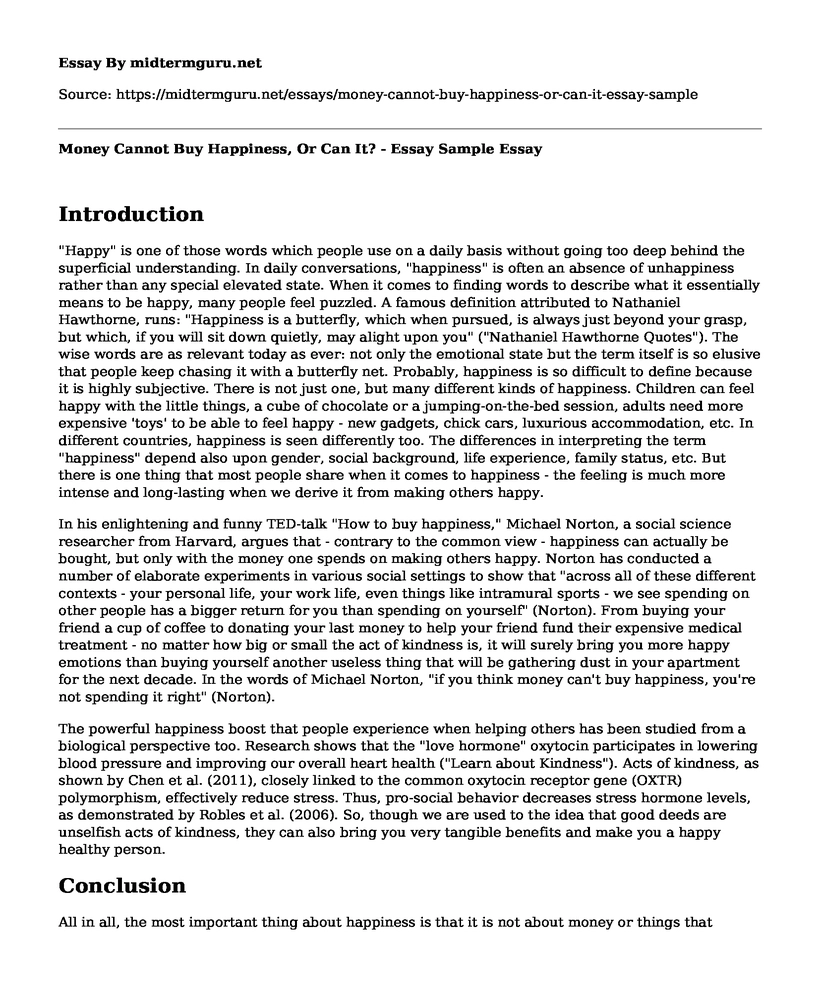Introduction
"Happy" is one of those words which people use on a daily basis without going too deep behind the superficial understanding. In daily conversations, "happiness" is often an absence of unhappiness rather than any special elevated state. When it comes to finding words to describe what it essentially means to be happy, many people feel puzzled. A famous definition attributed to Nathaniel Hawthorne, runs: "Happiness is a butterfly, which when pursued, is always just beyond your grasp, but which, if you will sit down quietly, may alight upon you" ("Nathaniel Hawthorne Quotes"). The wise words are as relevant today as ever: not only the emotional state but the term itself is so elusive that people keep chasing it with a butterfly net. Probably, happiness is so difficult to define because it is highly subjective. There is not just one, but many different kinds of happiness. Children can feel happy with the little things, a cube of chocolate or a jumping-on-the-bed session, adults need more expensive 'toys' to be able to feel happy - new gadgets, chick cars, luxurious accommodation, etc. In different countries, happiness is seen differently too. The differences in interpreting the term "happiness" depend also upon gender, social background, life experience, family status, etc. But there is one thing that most people share when it comes to happiness - the feeling is much more intense and long-lasting when we derive it from making others happy.
In his enlightening and funny TED-talk "How to buy happiness," Michael Norton, a social science researcher from Harvard, argues that - contrary to the common view - happiness can actually be bought, but only with the money one spends on making others happy. Norton has conducted a number of elaborate experiments in various social settings to show that "across all of these different contexts - your personal life, your work life, even things like intramural sports - we see spending on other people has a bigger return for you than spending on yourself" (Norton). From buying your friend a cup of coffee to donating your last money to help your friend fund their expensive medical treatment - no matter how big or small the act of kindness is, it will surely bring you more happy emotions than buying yourself another useless thing that will be gathering dust in your apartment for the next decade. In the words of Michael Norton, "if you think money can't buy happiness, you're not spending it right" (Norton).
The powerful happiness boost that people experience when helping others has been studied from a biological perspective too. Research shows that the "love hormone" oxytocin participates in lowering blood pressure and improving our overall heart health ("Learn about Kindness"). Acts of kindness, as shown by Chen et al. (2011), closely linked to the common oxytocin receptor gene (OXTR) polymorphism, effectively reduce stress. Thus, pro-social behavior decreases stress hormone levels, as demonstrated by Robles et al. (2006). So, though we are used to the idea that good deeds are unselfish acts of kindness, they can also bring you very tangible benefits and make you a happy healthy person.
Conclusion
All in all, the most important thing about happiness is that it is not about money or things that money can buy. There is no need to wait for some wonderful things to happen, for the rain to stop, for the summer to begin. You cannot buy happiness but you have the power to synthesize it. A happiness researcher Dan Gilbert offers an insightful conclusion, "...we have within us the capacity to manufacture the very commodity we are constantly chasing when we choose experience" (Dan Gilbert). Happiness is what we feel when we make others happy.
Works Cited
Chen, Frances S., et al. "Common Oxytocin Receptor Gene (OXTR) Polymorphism and Social Support Interact to Reduce Stress in Humans." Proceedings of the National Academy of Sciences of the United States of America, vol. 108, no. 50, 2011, pp. 19937-19942. JSTOR, www.jstor.org/stable/23060054.
Gilbert, Dan. "The surprising science of happiness." TED, TED, Feb. 2004. 16 April 2019. https://www.ted.com/talks/dan_gilbert_asks_why_are_we_happy/transcript#t-478572.
"Learn about kindness: Facts." Random Acts of Kindness Foundation. 16 April 2019. https://www.randomactsofkindness.org/learn-about-kindness#kindness-articles-index
"Nathaniel Hawthorne Quotes." BrainyQuote.com, BrainyMedia Inc, 2019. 16 April 2019. https://www.brainyquote.com/quotes/nathaniel_hawthorne_393626
Norton, Michael. "How to Buy Happiness." TED, TED, Nov. 2011. 16 April 2019. www.ted.com/talks/michael_norton_how_to_buy_happiness.
Robles, Theodore F., et al. "Positive Behaviors during Marital Conflict: Influences on Stress Hormones." Journal of Social and Personal Relationships, vol. 23, no. 2, 2006, pp. 305-325., doi:10.1177/0265407506062482.
Cite this page
Money Cannot Buy Happiness, Or Can It? - Essay Sample. (2022, Dec 21). Retrieved from https://midtermguru.com/essays/money-cannot-buy-happiness-or-can-it-essay-sample
If you are the original author of this essay and no longer wish to have it published on the midtermguru.com website, please click below to request its removal:
- Philosophers Main View about Consciousness, The Self, and Personal Identity
- Mid Term Questions on Globalization: Marx, Giddens, Weber
- Paper Example on Media Ethics Theory
- Essay Sample on Ethical Reasoning: Kant Versus Stuart Mill
- Residents of Prinsloo vs Oil Refinery: An Ethical Dilemma - Essay Sample
- Organizational Ethics: Key Considerations for Decision Making - Essay Sample
- Ethics & Equity in Health Care: Tracking Policy Agenda - Essay Sample







